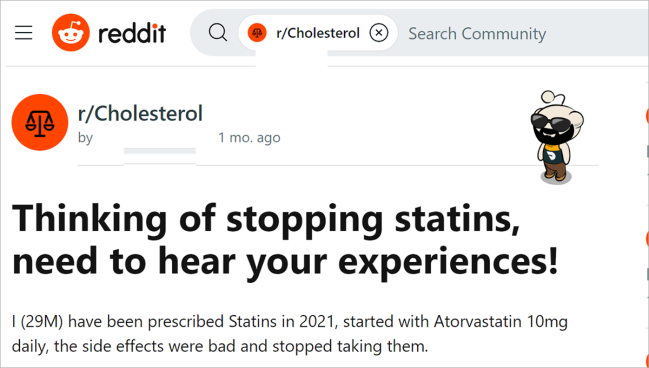AI Gleans Insights Into Statin Questions, Misinformation Online
Among the novel findings was that many people on keto diets are worried about elevated LDL levels. Their physicians are, too.

Physicians who prescribe statins to their patients likely have no idea that for some of them compliance hinges on information gleaned from social media discussions, a new study suggests.
“We know that guideline-indicated statin use is suboptimal,” lead author Sulaiman Somani, MD (Stanford University School of Medicine, Palo Alto, CA), told TCTMD. “We also know that there's a ton of data out there on social media which might contain people’s beliefs about statins that may be complementary to those uncovered from preexisting registries or qualitative studies.”
To look at the issue, Somani and colleagues harnessed the ability of artificial intelligence (AI) to comb through a “potential treasure trove of valuable perspectives.” The focus of their analysis was Reddit, the social media platform with thousands of forums devoted to asking and answering questions on very specific topics. Within Reddit’s grouping system, posts related to statins were most commonly found in r/keto, r/cholesterol, r/diabetes, and r/science.
“Another aim of this study was to see how people were feeling toward statins: positive, negative, or neutral,” Somani said. “What we found was that there is, on average, a lot of neutrality or negativity in discussions, and very few of them were positive.”
Social Media and Statin Talk
The form of AI the researchers describe in their paper, published in JAMA Network Open, is a natural language processing (NLP) pipeline, which they put to work analyzing approximately 10,000 discussions posted in a variety of subreddits.
Overall, the discussions people were having about statins revolved around six main themes:
- Ketogenic diets, diabetes, supplements, and statins
- Adverse effects
- Hesitancy
- Clinical trial appraisals
- Pharmaceutical industry bias
- Red yeast rice
Of the most searched-for terms related to statins, “Lipitor” (Pfizer) comprised 12.7% of all discussions, followed by its generic name “atorvastatin,” then “Crestor” (rosuvastatin; AstraZeneca), and “simvastatin.”
Three topics also stood out as being among the most common related to comments or answers about statins: elevated low-density lipoprotein cholesterol (LDL-C) on a ketogenic diet; requests for advice or experience regarding changes in lipid panels; and firsthand perspectives on statin efficacy and adverse effects.
One example from the keto-related discussions involves an individual asking others in the forum why their cholesterol is so high after losing weight, working out, avoiding fast food, and having “good” blood pressure. They then ask: “Do you think I can fix this naturally?”
In another discussion, someone says despite their 34-pound weight loss on keto, their physician is “eager” for them to restart a statin and “is extremely concerned” about their high LDL.
“We also saw many discussions questioning the causal relationship between an elevated LDL-C and incidental heart disease,” Somani said. “Some of these discussions revolved around how supplements are extremely effective at lowering LDL levels.”
However, as the recent SPORT trial showed, nothing could be further from the truth, Somani noted. With data like those on their side, he added, it’s up to physicians to try to combat at least some of the misinformation their patients may be encountering or even seeking out from questionable sources online.
Knowledge About Online Attitudes Can Aid Physician Preparedness
Those who spoke negatively about statins frequently insinuated unsubstantiated claims that increased Alzheimer’s disease risk was a trade-off for decreased CVD risk, for example, or that statins are “poison” or unhealthy. Others related adverse effects that they experienced or had heard can happen to people taking statins.
With regard to the red yeast rice discussions, these tended to be mixed negative or neutral posts about avoiding statins, while also claiming that red yeast rice is a statin and may be helpful since it was used in ancient Chinese medicine for CV health.
“It’s important to be prepared if patients ask you questions about statins, . . . and it’s also important to identify some of these common misconceptions around statins from a public health standpoint, because they can certainly impact behaviors and perceptions about statins,” Somani added.
Additionally, the researchers say the methods they used to pose the question to the AI interface may serve as a blueprint for others who are looking to use it to shed light on similar clinical questions. “This approach may be useful for researchers who want to get a sense of emerging beliefs around certain clinical concepts,” Somani said.
He and his group released the coding tool they used on GitHub, where anyone can access it.
L.A. McKeown is a Senior Medical Journalist for TCTMD, the Section Editor of CV Team Forum, and Senior Medical…
Read Full BioSources
Somani S, van Buchem MM, Sarraju A, et al. Artificial Intelligence-enabled analysis of statin-related topics and sentiments on social media. JAMA Network Open. 2023;6(4):e239747.
Disclosures
- Somani reports no relevant conflicts of interest.





Comments